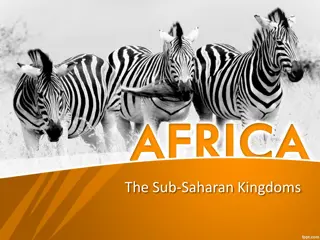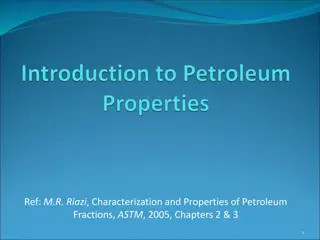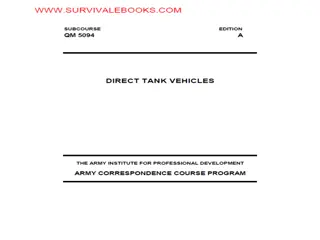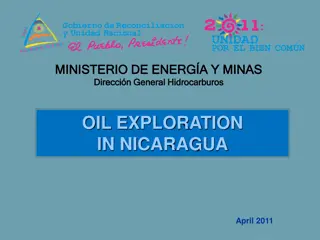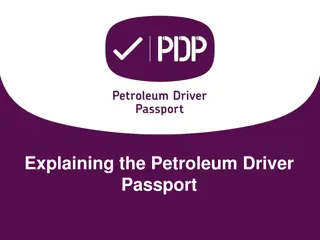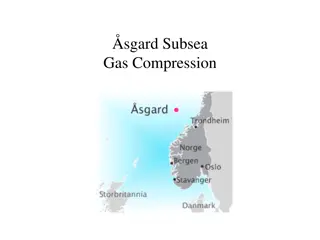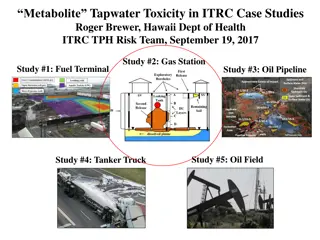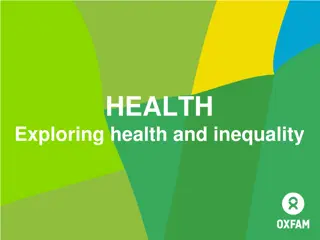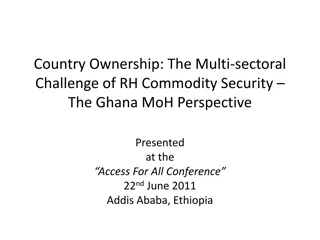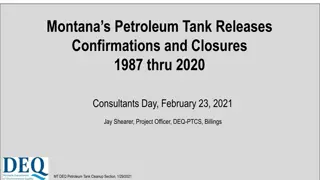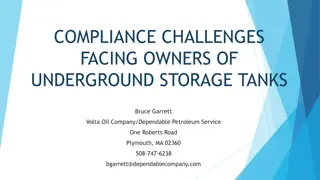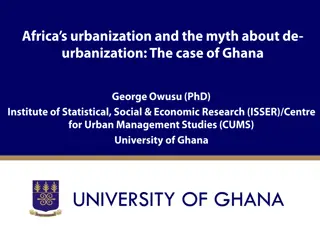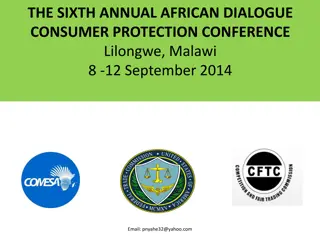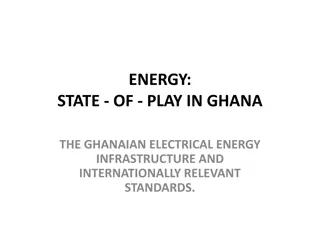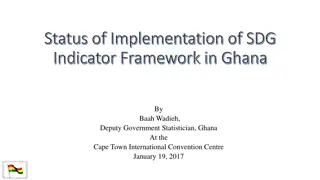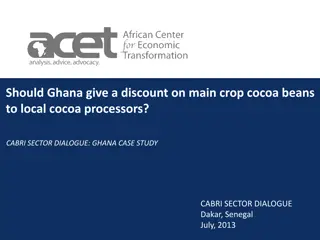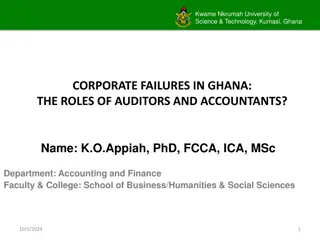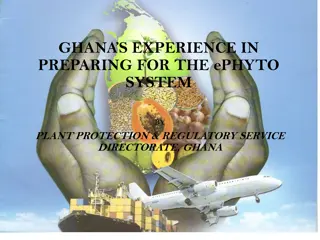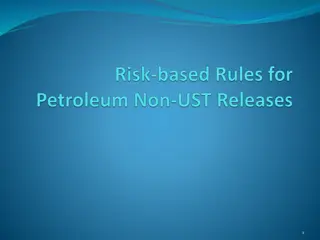Overview of Ghana's Petroleum Downstream Industry
The Ghana Petroleum Downstream Industry plays a vital role in the transportation, processing, distribution, and marketing of refined petroleum products. The industry has seen key policy objectives focusing on deregulation and liberalization to promote competition and efficiency. Historical milestones highlight the transition to a more market-oriented approach, with the establishment of the National Petroleum Authority overseeing the deregulated market.
Download Presentation

Please find below an Image/Link to download the presentation.
The content on the website is provided AS IS for your information and personal use only. It may not be sold, licensed, or shared on other websites without obtaining consent from the author.If you encounter any issues during the download, it is possible that the publisher has removed the file from their server.
You are allowed to download the files provided on this website for personal or commercial use, subject to the condition that they are used lawfully. All files are the property of their respective owners.
The content on the website is provided AS IS for your information and personal use only. It may not be sold, licensed, or shared on other websites without obtaining consent from the author.
E N D
Presentation Transcript
GHANA PETROLEUM DOWNSTREAM INDUSTRY GHANA PETROLEUM DOWNSTREAM INDUSTRY
Presentation Outline Presentation Outline Introduction Downstream facts and figures Role of NPA Overview of Petroleum Downstream Licensing Process in Ghana Reasons for working visit 9/11/2024 2
Introduction Introduction - - Ghana Petroleum Sector Ghana Petroleum Sector Transportation and processing (Gas) Refinery, Distribution and Marketing of refined products Downstream Oil & Gas Production and Exploration Midstream Upstream 9/11/2024 3
Introduction Introduction Downstream policy objective Downstream policy objective Key policy focus for the petroleum downstream is removal of government control (deregulation) with the following objectives: 1. Price De-control (Price liberalization) Achieved in 2015 Achieved in 2015 2. Removal of restrictions on the establishment and operation of facilities Achieved in 2004 Achieved in 2004 3. Removal of restrictions on the importation of crude oil and petroleum products Achieved in 1996 Achieved in 1996 9/11/2024 4
Introduction Introduction Historical Milestones Historical Milestones September 2006: September 2006: Private sector company Private sector company licensed to sell licensed to sell wholesale to the OMCs wholesale to the OMCs and bulk consumers and bulk consumers July 2015: July 2015: Petroleum Petroleum Product Price Product Price Deregulation Deregulation 2015 2015 2006 2006 2007 2007 2005 2005 October 2007: October 2007: Bi weekly adjustment of weekly adjustment of petroleum products petroleum products prices to reflect oil prices to reflect oil prices on the prices on the International market International market Bi- - June 2005: June 2005: The establishment of the establishment of the National Petroleum National Petroleum Authority (NPA) to oversee Authority (NPA) to oversee the deregulated market in a the deregulated market in a takeover from the National takeover from the National Petroleum Tender Board Petroleum Tender Board 9/11/2024 The 5
Downstream Facts & Figures Downstream Facts & Figures Supply chain Supply chain Aviation Industry Aviation Industry Mining Industry Mining Industry Refinery Refinery Shipping Shipping Storage Storage Marine Industry Marine Industry Importation of crude oil and refined products Importation of crude oil and refined products Retail Market Retail Market Export Market Export Market 9/11/2024 6
Downstream Facts & Figures Downstream Facts & Figures Service Providers Service Providers REFINING REFINING RETAIL (Local & Export) STORAGE STORAGE SHIPPING SHIPPING TRANSPORT TRANSPORT OMCs (114) LPGMCs (42) Retail Outlets (3,944) Export Companies (26) TOR OTCs (27) BDCs (35) Transport Operators (562) BRVs (3,649) VLTC (1) TOR Platon Oil & Gas Akwaaba Link BOST TOR Depot BDC Storage (11) SUPPORTING COMPANIES LICENSED BY AUTHORITY SUPPORTING COMPANIES LICENSED BY AUTHORITY Mooring Company (1) Ghana Ports & Harbor Authority SPM & CBM (1) Oil Jetty (2) Stratification Company (1) Bunkering Companies (55) Tank Cleaning (10) Calibration (9) Kerosene Outlets (57) Filling Stations (1,381) LPG Outlets (666) Reseller Outlet (168) Service Station (1,672) Lubricant Manufacturing Companies (2) Lube Blending (9) 7 9/11/2024
Downstream Facts and Figures Downstream Facts and Figures - - Consumption Consumption ATK 2.7% Premix 1.6% Fuel oil 0.3% Petrol 32.7% Diesel 46.7% Total annual consumption of over 4billion litres LPG 8% Gasoil (Mines) 6% Kerosene 0.2% MGO Foreign 0.2% MGO Local 0.9% Gasoil (Rig) 0.9% 9/11/2024 8
Downstream Facts and Figures Downstream Facts and Figures - - Storage Storage Total National Storage capacity of petroleum products is estimated at 1.3 million MT. Premix, 0.3% Kerosene, 2.5% Unified, 0.1% LPG, 2.0% ATK, 4.3% Crude, 22.4% PMS, 28.5% AGO, 39.9% 9/11/2024 9
Role of NPA Role of NPA NPA: Established under NPA act 2005, act 691 as a semi NPA: Established under NPA act 2005, act 691 as a semi- - autonomous agency to regulate, monitor and oversee autonomous agency to regulate, monitor and oversee activities of the downstream Industry activities of the downstream Industry 9/11/2024 10
Role of NPA Role of NPA Technical Divisions Technical Divisions Inspections and Monitoring to ensure compliance with Inspections and Monitoring to ensure compliance with industry industry standards standards IM&HSSE IM&HSSE Pricing and price risk management activities Pricing and price risk management activities National stocks management and planning National stocks management and planning Industry Research and business development Industry Research and business development PPR PPR Unified Petroleum Price Fund Operations Unified Petroleum Price Fund Operations Bulk Road Vehicle Tracking Operations Bulk Road Vehicle Tracking Operations Primary Distribution Margin Management Primary Distribution Margin Management UPPF UPPF Ensure integrity of quality of products supplied Ensure integrity of quality of products supplied Save tax revenue otherwise lost to the Save tax revenue otherwise lost to the state Save misapplied subsidies Save misapplied subsidies Quality Quality Assurance Assurance state Processing and issuance of licenses and permits Processing and issuance of licenses and permits Licensing Licensing 9/11/2024 11
Downstream Programmes & Policies Downstream Programmes & Policies 9/11/2024 12
Price Deregulation Price Deregulation Objective : Removal of government controls in pricing and elimination of subsidies Strategy : Petroleum Service Providers (PSPs) to set their price according to the prescribed PBU formula, PSPs to ensure their company prices are the same throughout the country Successes : Elimination of subsidy, lower competitive prices and higher investor confidence Next Steps : Deregulation of transportation 9/11/2024 13
Low Sulphur Fuels Objective : Reduce maximum Sulphur in fuels as follows Diesel: 3000ppm to 50ppm Petrol: from 1000ppm to 50ppm Strategy : BDCs to import at 50ppm diesel and petrol. BDCs started importation of 50ppm in August, 2017 Challenges : No clear indication from TOR about plans to retrofit the refinery. 9/11/2024 14
National LPG policy Objective : Adopt an LPG cylinder recirculation policy Strategy : Change of current LPG marketing operations to reflect cylinder recirculation model. Revise the LPG supply chain to include bottling plants, Limitation of current refilling plant marketing of LPG to autogas Successes : Policy was approved by Cabinet in October 2017. Implementation Committee has been formed to plan and oversee the implementation 9/11/2024 15
OVERVIEW OF PETROLEUM LICENSING PROCESS OVERVIEW OF PETROLEUM LICENSING PROCESS IN GHANA IN GHANA 9/11/2024 16
LICENSING OF PERTOLEUM SERVICE PROVIDERS LICENSING OF PERTOLEUM SERVICE PROVIDERS Sections 11 (1) and (2) of the NPA Act, Act 691 stipulate that: 1. A person shall not engage in a business or commercial activity in the downstream industry unless that person has been granted a licence for that purpose by the Board. 2. The business or commercial activities of the downstream industry in respect of crude oil, gasoline, diesel, liquefied petroleum gas, kerosene and other designated petroleum products are (a) importation, (b) exportation, (c) re-exportation, (d) shipment, (e)transportation, (f) processing, (g) refining, (h) storage, (i) distribution, (k) sale. (j) marketing, and 9/11/2024 17
LICENSING OF PERTOLEUM SERVICE PROVIDERS LICENSING OF PERTOLEUM SERVICE PROVIDERS Section 30 of the Act also stipulates that A person shall not construct or operate in the petroleum downstream industry (a) a petroleum products retail station, (b) a petroleum products storage depot and pipeline, (c) a liquefied petroleum gas depot, or (d) an oil refinery without the prior written authorization of the Board . 9/11/2024 18
LICENSING OF PERTOLEUM SERVICE PROVIDERS LICENSING OF PERTOLEUM SERVICE PROVIDERS The Licensing Division has outlined various requirements needed to obtain licences and permits for the various categories of PSPs listed. These are available as Public Notices of the NPA (NPA N. 001 to NPA N. 031). All licence applications are submitted in hard copy at the NPA Head Office in Accra. Applicants are required to pay a non-refundable processing fee for each licence application. The application is reviewed by the Division and forwarded to the NPA Licensing Committee for further consideration and subsequent approval by the Governing Board. Upon Approval, applicants will be issued with a licence subject to full payment of the new entrant licence fee.
RENEWAL OF LICENCE RENEWAL OF LICENCE ***All PSP Licences expire on 31st December of the calender year. In line with Section 15(4) of the NPA Act 2005, (Act 691), all PSPs are required to apply for the renewal of their licences 60 days prior to the expiration of their licences. Documentation Requirements 1. Audited Financial Accounts for previous year 2. Annual Returns as filed at the Registrar Generals Department; 3. Current Directors And Shareholders; and 4. Payment Of Annual Renewal Fee.
CONSEQUENCES FOR NON CONSEQUENCES FOR NON- -COMPLIANCE WITH THE REQUIREMENTS FOR THE RENEWAL OF LICENCES REQUIREMENTS FOR THE RENEWAL OF LICENCES COMPLIANCE WITH THE In line with Section 18 of the NPA Act, 2005, (Act 691),failure to comply with the requirements and deadline for the renewal of licences will result in the following: Sanctions and penalties for late renewal. Refusal to renew licence. Withdrawal of licence. Suspension of licence. Revocation of licence.
REASONS FOR WORKING VISIT REASONS FOR WORKING VISIT To fully automate licensing procedures to ensure swift processing of all licence applications. The NPA has already acquired an Enterprise Relational Database Management System to automate some operations. (Phase 1 has been fully deployed) Phase 2 will include the full automation of licensing procedures. The NPA will require first hand information from the Department of Energy on the implementation challenges and areas of concern in this regard. 9/11/2024 22
9/11/2024 23


